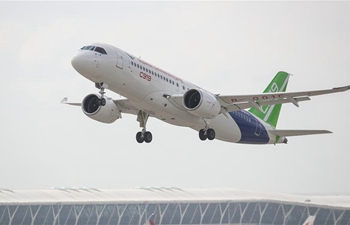BERLIN, July 16 (Xinhua) -- German companies are increasingly burdened with an insufficient provision of public infrastructure in their country, a study published on Monday by the German Economic Institute (IW) finds.
According to the IW study, around two thirds (68 percent) of German companies were regularly impeded in their commercial activities by the poor state of critical infrastructure provided by authorities through roads, bridges, or high-speed internet connections. Sixteen percent of companies further indicated that they faced "severe impediments" as a consequence.
The findings were based on a survey of 2,800 German companies. Back in 2013, the last year in which the study was published, 58 percent of respondents lamented suffering from impediments in general while 10 percent complained about "severe" impediments.
In light of the deteriorating trend, study author Thomas Puls warned that a failure by the government to ramp up infrastructure spending significantly would harm Germany's future growth prospects. "Businesses are reliant on logistical processes which are as smooth as possible. Deficient infrastructure represents a spanner in the works (of firms) in this context", Puls said.
The IW study highlighted that the most infrastructure-related obstacles encountered by companies were related to ageing motorways where the growing appearance of wear and tear issues caused traffic jams and in turn longer transportation times. Businesses in the construction sector (80 percent) in particular complained often about experiencing this type of impediment.
Speaking to Xinhua on Monday, Puls explained that a protracted period of complacency among federal-, regional- and municipal lawmakers with regards to infrastructure investment was partially to blame for the situation. "Germany has slept for the last 15 years and has neglected the expansion and maintenance of its roads while traffic performance has increased", the IW expert said.
Puls further emphasized that the issues encountered were not just limited to roads. "Some of the lock systems on Germany's riverways date back to the German Empire and the risk of malfunctions has become critical." While only relatively few sectors relied on transport by boat, it was "particularly important for chemical and steel producers such as BASF or Bayer."
Overall, North Rhine-Westphalia and Baden-Wuerttemberg were identified by IW as the two German states with the most deplorable state of infrastructure. While western German companies mainly complained about the low quality of roads and waterways, their eastern German counterparts frequently lamented the adverse impact of poor communication networks on their operations.
Commenting on the later finding, Puls argued in the study that "Germany cannot afford to lag behind in a future-oriented area like communication." He pointed to the urgent need for government authorities to hire more civil engineers as a first step to solving the country's general infrastructure malaise.
The state-owned KfW banking group has recently estimated that municipal governments in Germany are confronted with an outstanding requirement for infrastructure investment totaling 159 billion euros (186 billion U.S. dollars) in 2018. Nearly 36 percent of authorities reported a "significant backlog" of investments, compared to 17 percent in neighboring France and an average rate of 33 percent across Europe.













